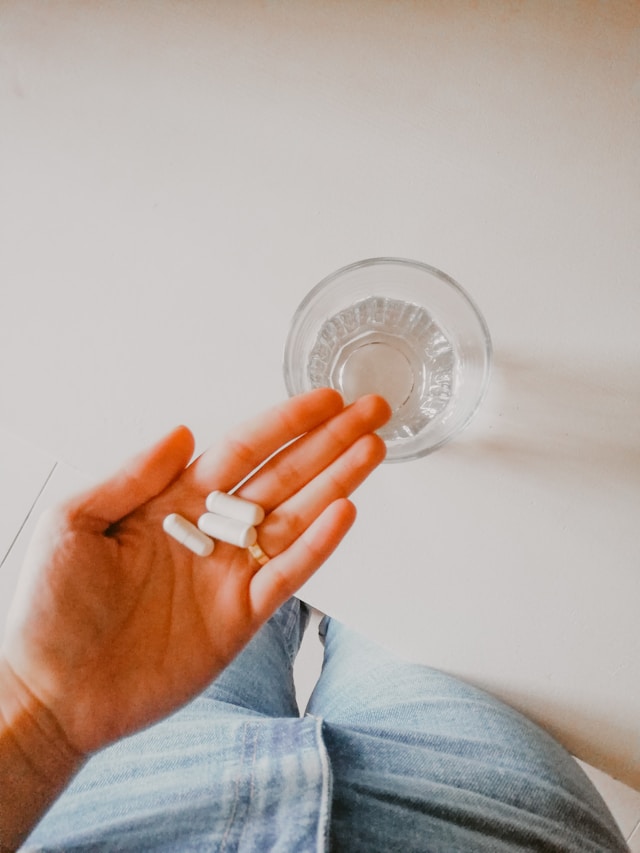How Lifestyle Choices Affect Aging and Longevity
Our lifestyle choices play a crucial role in how we age. While genetics are important, factors like diet, exercise, sleep...
The Impact of Lifestyle on Aging
Our daily habits play a pivotal role in determining how we age. While genetic factors contribute to longevity, research shows that lifestyle choices such as diet, exercise, sleep, and stress management account for a significant proportion of healthy aging outcomes. Proactively addressing lifestyle and aging can delay the onset of chronic illnesses, maintain physical and mental resilience, and promote overall wellness.
Diet, Exercise, and Sleep for Longevity
The cornerstones of a long and healthy life are a nutrient-dense diet, consistent physical activity, and restorative sleep. Together, these elements form the foundation of healthy choices that promote sustainable wellness and reduce age-related decline.
Diet: A Key to Longevity
Nutrition profoundly impacts aging and overall health and wellness. A well-balanced longevity diet includes a variety of whole, unprocessed foods such as fruits, vegetables, whole grains, nuts, and lean proteins. The Mediterranean diet is one of the best examples of a diet that supports longevity. It is rich in polyphenols, healthy fats like olive oil, and omega-3 fatty acids, which help reduce systemic inflammation and oxidative stress (Martínez-González et al., 2017).
Caloric restriction (CR)—reducing calorie intake without malnutrition—has been extensively studied for its anti-aging effects. CR activates key biological pathways such as AMPK and sirtuins while suppressing mTOR, which is associated with aging and chronic diseases. Intermittent fasting, an alternative to CR, provides similar benefits by enhancing autophagy, the body’s natural process for clearing damaged cells, while improving metabolic flexibility (Fontana & Partridge, 2015). Incorporating these dietary approaches as part of a longevity diet can help optimize cellular function and extend healthspan.
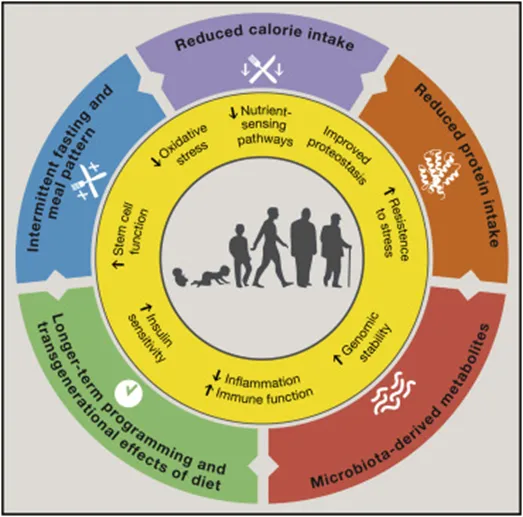
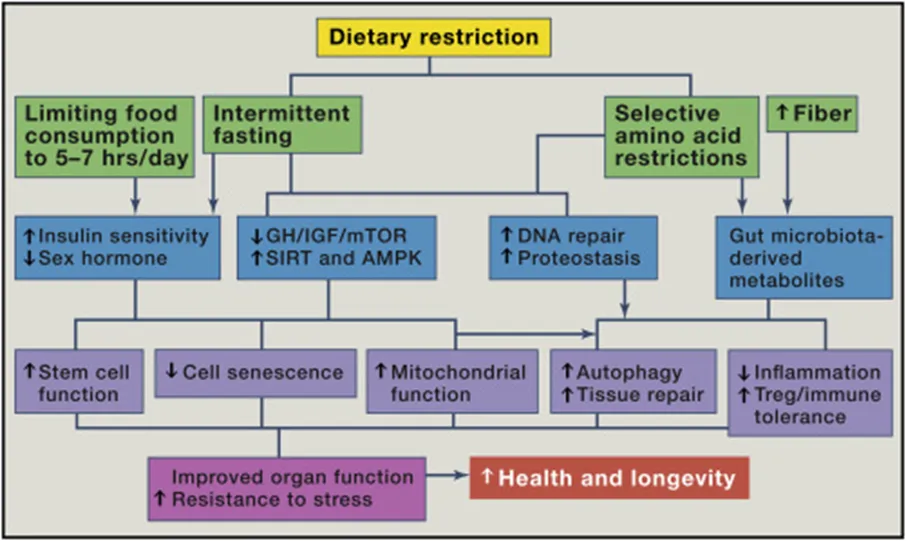
Exercise: The Fountain of Youth
Physical activity is essential for both physical and cognitive health as we age. Aerobic exercise, such as brisk walking, cycling, or swimming, improves cardiovascular health, reduces oxidative stress, and enhances mitochondrial function. Resistance training, on the other hand, preserves muscle mass and bone density, reducing the risk of sarcopenia and frailty (Rebelo-Marques et al., 2018).
"Experts recommend at least 150 minutes of moderate-intensity aerobic activity per week combined with strength training twice weekly for optimal results. These healthy choices combat chronic inflammation and contribute significantly to wellness and aging, ensuring that individuals maintain mobility, strength, and independence well into old age (Piercy et al., 2018)."
Exercise also provides psychological benefits, releasing endorphins that boost mood and reduce stress. Over time, regular physical activity helps build emotional resilience, further supporting long-term wellbeing.
The Power of Sleep
Sleep is a vital yet often overlooked factor in aging and overall health and wellness. During deep sleep, the body engages in critical repair processes such as DNA repair, tissue regeneration, and hormone regulation. Conversely, inadequate sleep has been linked to higher risks of cardiovascular disease, diabetes, and cognitive decline (Walker, 2017).
To optimize sleep, individuals should aim for 7–9 hours of uninterrupted rest per night. Key strategies include maintaining a consistent sleep schedule, minimizing light exposure before bedtime, and creating a calming pre-sleep routine. Supplements like Magnesium Bisglycinate or Ashwagandha can also support better sleep quality by reducing anxiety and promoting relaxation (Huberman, 2021). Addressing sleep as part of a holistic approach ensures better long-term wellbeing and enhances recovery from daily stressors.
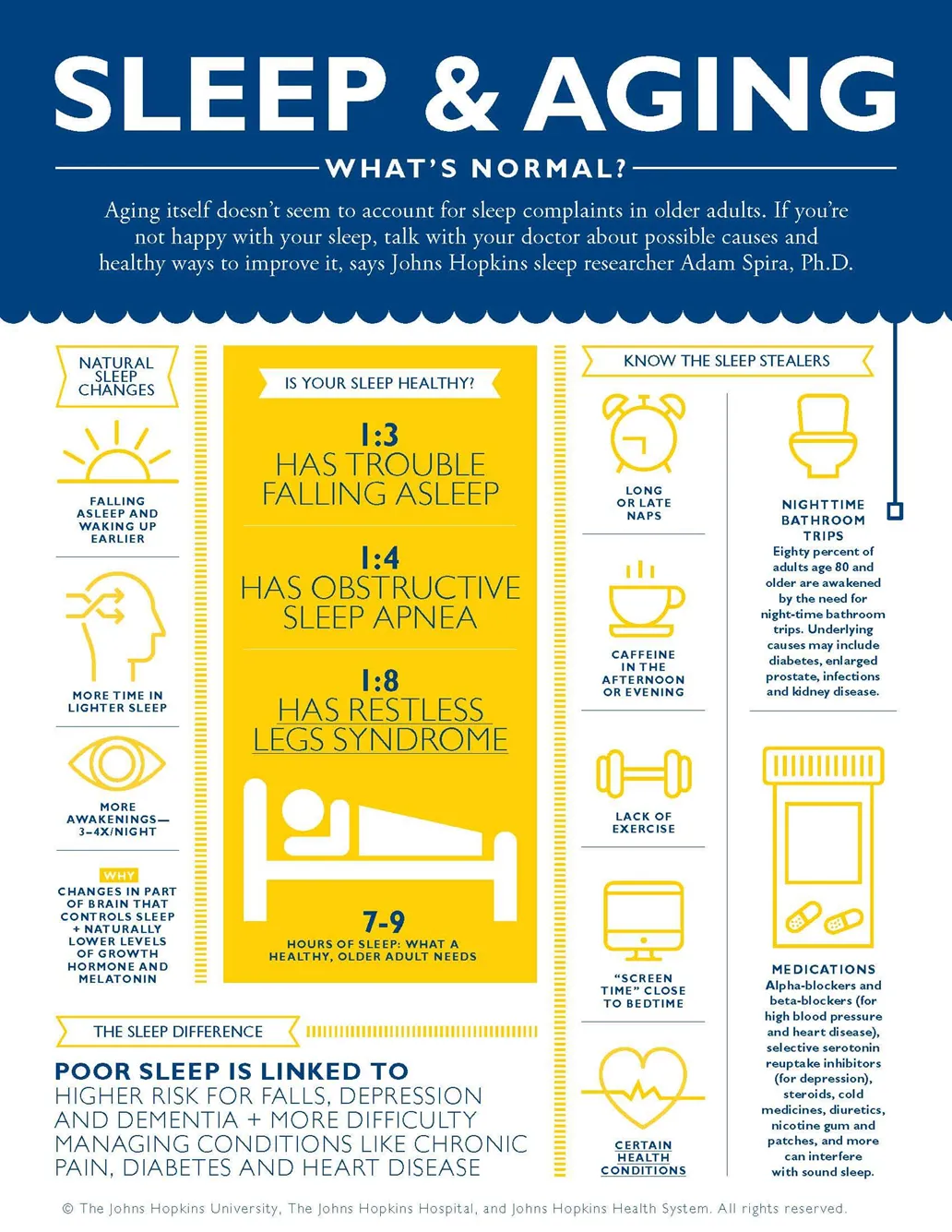
Supplementing a Longevity-Centered Lifestyle
While diet, exercise, and sleep form the foundation of healthy aging, supplements can amplify these efforts by targeting the biological pathways that drive aging. High-quality longevity supplements complement other healthy choices by enhancing cellular energy, reducing inflammation, and supporting DNA repair, making them a valuable addition to a comprehensive lifestyle for longevity.
Boosting Cellular Energy Production
Mitochondrial dysfunction, a hallmark of aging, leads to reduced cellular energy and metabolic efficiency. NAD+ precursors such as NMN replenish NAD+ levels, which are essential for mitochondrial function, DNA repair, and overall metabolic health (Covarrubias et al., 2021). These supplements restore the energy needed for optimal cellular performance, countering the natural decline associated with aging.
Urolithin A, another powerful ingredient found in longevity supplements, promotes mitophagy, the process by which cells remove damaged mitochondria and replace them with healthy ones. This improves muscle endurance and reduces fatigue, enhancing physical performance and wellbeing (D'Amico & Navas, 2021).
Reducing Inflammation and Supporting Cellular Health
Chronic inflammation, or "inflammaging," accelerates cellular aging and increases the risk of age-related diseases. Senolytics like Fisetin and Quercetin target and clear senescent cells—damaged cells that contribute to inflammation and tissue dysfunction. By removing these cells, these supplements reduce systemic inflammation and improve tissue health (Saavedra et al., 2023).
Antioxidants like Resveratrol also play a key role in reducing oxidative stress, protecting cells from free radical damage, and supporting cardiovascular and brain health. These ingredients are particularly beneficial for wellness and aging, as they mitigate some of the primary drivers of cellular decline.
Enhancing DNA Repair and Genomic Stability
Over time, DNA damage accumulates, impairing cellular function and increasing susceptibility to chronic diseases. Ingredients such as Resveratrol and NAD+ precursors, like NMN, activate sirtuins—proteins that play a crucial role in DNA repair and maintaining genomic stability (Fontana & Partridge, 2015). These supplements support cellular longevity by ensuring that DNA repair processes remain efficient, a critical factor in maintaining health and wellness.
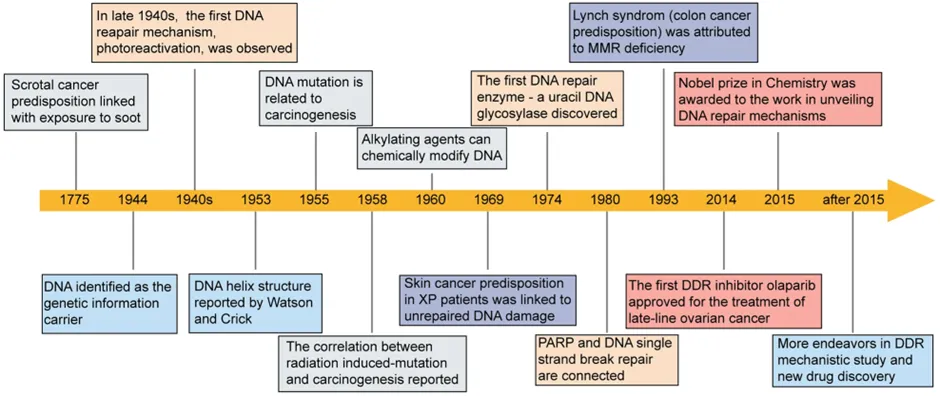
Building a Longevity-Promoting Lifestyle
The relationship between lifestyle and aging underscores the importance of daily habits. By prioritizing a longevity diet, engaging in regular physical activity, optimizing sleep, and integrating targeted longevity supplements, individuals can make healthy choices that promote long-term vitality. These strategies enhance wellness and aging, ensuring not only a longer life but also a richer, more fulfilling one. With consistent effort and attention to these longevity tips, achieving sustainable wellbeing becomes an attainable goal.
References
- Rebelo-Marques A, De Sousa Lages A, Andrade R, Ribeiro CF, Mota-Pinto A, Carrilho F, Espregueira-Mendes J. (2018). Aging Hallmarks: The Benefits of Physical Exercise. Front Endocrinol. Front Endocrinol (Lausanne). 2018 May 25;9:258.
- Saavedra, D., Añé-Kourí, A.L., Barzilai, N. et al. Aging and chronic inflammation: highlights from a multidisciplinary workshop. Immun Ageing 20, 25 (2023). https://doi.org/10.1186/s12979-023-00352-w
- D'Amico D, Andreux PA, Valdés P, Singh A, Rinsch C, Auwerx J. (2021) Impact of the Natural Compound Urolithin A on Health, Disease, and Aging. Trends Mol Med. Jul;27(7). 10.1016/j.molmed.2021.04.009
- López-Otín, C., et al. (2013). The hallmarks of aging. Cell, 153(6), 1194–1217. https://doi.org/10.1016/j.cell.2013.05.039
- Maldonado, E., et al (2023). Aging Hallmarks and the Role of Oxidative Stress. Antioxidants, 12(3), 65 https://doi.org/10.3390/antiox12030651
- Martínez-González MÁ, Hershey MS, Zazpe I, Trichopoulou A. (2017). Transferability of the Mediterranean Diet to Non-Mediterranean Countries. What Is and What Is Not the Mediterranean Diet. Nutrients. Nov 8;9(11):1226 https://www.mdpi.com/2072-6643/9/11/1226
- Piercy, K. L., et al. (2018). The Physical Activity Guidelines for Americans. JAMA, 320(19), 2020–2028. https://doi.org/10.1001/jama.2018.14854
- Walker, M. P. (2017). Why We Sleep: Unlocking the Power of Sleep and Dreams. Scribner.
- Covarrubias, A. J., Perrone, R., Grozio, A., & Verdin, E. (2021). NAD+ metabolism and its roles in cellular processes during ageing. Nature reviews. Molecular cell biology, 22(2), 119–141. https://doi.org/10.1038/s41580-020-00313-x
Read next






